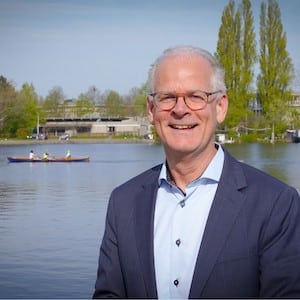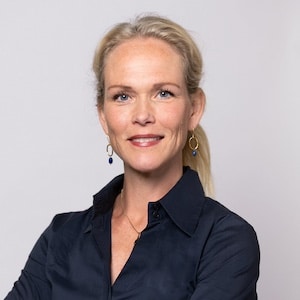Peter Smit: ‘Back to old-fashioned poldering’
Are these bold choices and breakthroughs actually necessary? Peter Smit, a board member Water Authority Amstel, Gooi and Vecht until June 2023, doesn't think so. "We need to get back to that old-fashioned poldering."
We talked to Peter Smit in an interview series on the development of the call Choosing what’s needed for the Metropolis of Tomorrow. Working on this marked the start of the movement Look differently, act differently; this involves rethinking and engaging with all stakeholders. Making breakthroughs and bold choices possible. Does he recognise the call for a new perspective and other ways of working together?
What did you notice when you read the call?
“This recommendation immediately caught my eye: ‘Focus more sharply on where our inclusive prosperity will come from in 2040.’ As an administrator, I’m actually used to looking further ahead. 2040 is an intermediate step for a water authority. As a precautionary organisation, we look to 2050, 2100 and 2123. That long-term perspective is important for investment decisions. I think all administrative organisations should become precautionary organisations. A house that’s built today, will probably still be there in 80 years. So you have to think very carefully about where to put it.”

Peter Smit
Balancing between today and the distant future is not always easy for administrators.
“That’s right. In the Spatial Platform of the Metropoolregio Amsterdam (where regional administrators discuss the organisation of public spaces, ed.) I represented the four water authorities in the region. In those consultations, I sometimes saw councillors and deputies struggling with the long term and today’s reality. Those administrators have to deal with the city council, with Provincial Councils, with the needs of the day, the end of their term. It is then tempting to make quick, cheap short-term choices. Logical, because every administration is ambitious. That is why I am so pleased that we were able to lay a blue-green foundation in the Verstedelijkingsconcept 2050 (Urbanisation Concept).”
What does that entail?
“The Urbanisation Concept is the strategic document of municipalities and provinces in the Amsterdam Metropolitan Area. A blue-green foundation means that water and soil are guidelines in the design of scarce spatial resources. The lowest point of the Amstel, Gooi and Vecht area is six meters below NAP (Amsterdam Ordnance Datum). In view of expected sea level rises, we should not put vulnerable businesses in such a deep polder. Housing can be built, but like floating homes, for example.”
Managing water and soil aligns with the second of the nine principles of Look differently, act differently: People and nature are in balance.
So according to you, this is already being worked on?
“Indeed, it’s not necessarily a radical choice: the blue-green foundation for the Amsterdam Metropolis came about thanks to careful consultation. Poldering, of course, is the ultimate verb for a Dutch water authority. We have been doing that since the Middle Ages, and still water authorities are in constant talks with private and public parties, with civil society organisations, with farmers other businesses and governments.
“The term has been somewhat devalued, though: poldering is now deemed successful when everyone is a little bit happy. But that’s not what poldering is about: the ultimate poldering requires a focus on the end goal for the long term. For that, you need to talk. As far as I am concerned, we should re-appreciate that old-fashioned poldering.
“A good example of poldering in public-private partnerships, is the Toekomstbestendige Heuvelrug Gooi en Vechtstreek. In it, the water authority is working with six other partners to keep the region’s soil and water systems in balance. I am very proud of that collaboration and also see that it is influencing government.”
Looking and acting differently also means: finding other solutions to the current scarcity and crises. You don’t think that’s necessary?
“I am more about evolution than revolution. Radical choices are not always the right choices either. Take biomass, for example, which we put all our efforts into for a while. In hindsight it turned out to be dirty, and had us deplete entire forests in Eastern Europe. In my opinion, stimulating electric driving was also a fiscal mistake, offering fat subsidies to people who could pay for it just fine out of their own pockets.”
“We definitely need to take action and fix things that haven’t gone right. But radically? We can’t afford that: money is also scarce. I hope for a concrete action programme, with innovative financing arrangements. When financial needs arise at the beginning of an innovation, often people look away. That leads to delays and suboptimal solutions. I challenge the financial world to innovate and come up with win-win multi-party financing. That would benefit everyone and, more importantly, projects can get started faster.”
What other principles appeal to you?
“The ninth one interests me: ‘We need to make it easier to learn from each other and work together on innovations.’ Water authorities used to operate much more in the background, but due to the more extreme weather, we need to step up. That’s why we created suitability maps, for example. These indicate which space is suitable for what. We know that on high sandy soils you are more likely to suffer from drought and heat stress, for example.”
“Such information can be used by property developers. This way we help other parties to make good choices. I prefer that to enforcing rules. If we all keep in mind that everything must serve the people, the social domain, we needn’t make radical choices. Then we can still live, work and live carefree in a hundred years in the low delta where the Amsterdam Metropolitan Area is located.”
Read more interviews with partners about Look differently, act differently.
7 July 2023
Read more about
Contact us
Want to keep up to date?
Get the best regional news and events (in Dutch) via the Board Update newsletter
Share this news
Want to keep informed?
Follow us daily on LinkedIn and sign up for the Board Update newsletter.
Read more
- What AI applications are we already deploying for healthcare and wellbeing? What ...
- Adyen is one of the great success stories of Amsterdam’s tech ...
- Together with enthusiastic partners in three coalitions, the Amsterdam Economic Board is ...


